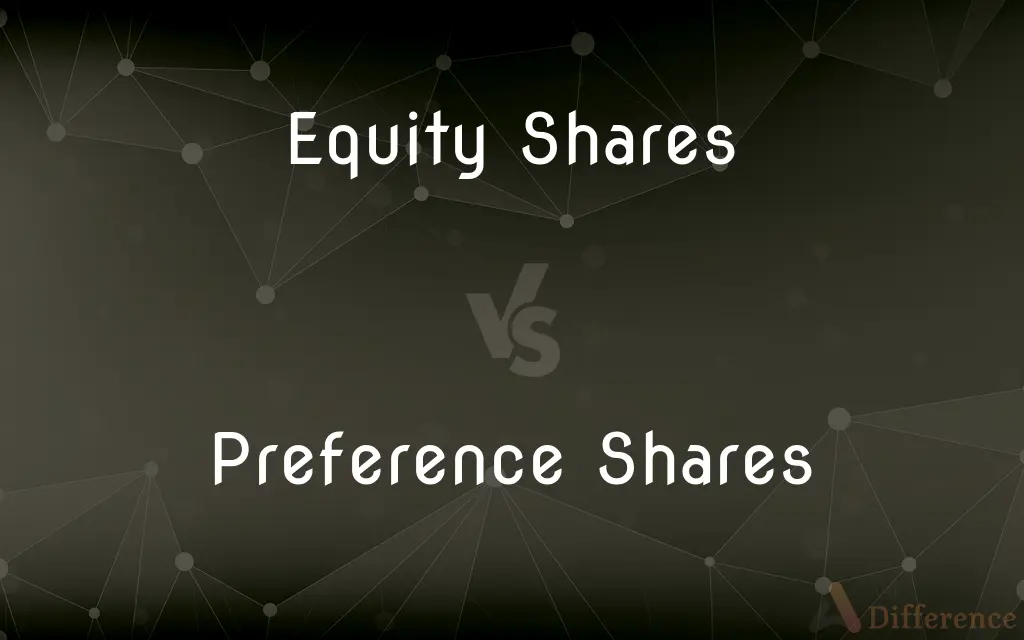Equity Shares vs. Preference Shares — What's the Difference?
Edited by Tayyaba Rehman — By Fiza Rafique — Published on December 23, 2023
Equity Shares represent ownership in a company and enjoy voting rights. Preference Shares prioritize dividends but may lack voting rights.

Difference Between Equity Shares and Preference Shares
Table of Contents
ADVERTISEMENT
Key Differences
Equity Shares and Preference Shares are primary vehicles for investing in a company's capital. Equity Shares, often known as common shares, grant ownership in a company and typically provide voting rights to shareholders. As the name suggests, Equity Shares give their holders a stake in the company's equity. In contrast, Preference Shares give shareholders a preferential right, mainly regarding the payment of dividends.
When dividends are distributed, Preference Shares holders are usually the first to receive their share. This preferential treatment ensures they get dividends before Equity Shares holders. On the downside, Preference Shares may not come with voting rights, which means shareholders might not have a say in company decisions. Equity Shares, however, often come with voting rights, allowing shareholders a voice in corporate decisions.
In the unfortunate event of a company's liquidation, Preference Shares holders again have an advantage. They stand ahead of Equity Shares holders in receiving the company's residual assets. Conversely, Equity Shares holders are last in line, making their investment riskier.
Equity Shares, due to their inherent risk, often have the potential for higher returns in the form of capital appreciation. The company's success directly affects the value of Equity Shares. Preference Shares, with their fixed dividend rate, can be more predictable and less volatile, resembling debt instruments in some ways.
To sum it up, while Equity Shares offer ownership with voting rights and potentially higher returns, Preference Shares provide a safer but potentially less rewarding investment, prioritizing dividend payments and liquidation rights.
ADVERTISEMENT
Comparison Chart
Voting Rights
Typically have
Often do not have
Dividend Payment
After Preference Shares
Receive dividends first
Risk
Higher due to last claim on assets
Lower due to preferential rights
Potential Returns
Variable, possibly higher returns
Fixed dividends, less volatility
Claim in Liquidation
After Preference Shares
Before Equity Shares
Compare with Definitions
Equity Shares
Common shares representing a stake in a firm.
With her Equity Shares, Mary had a say in the company's annual meeting.
Preference Shares
Shares with a claim on assets before equity shareholders in liquidation.
In the event of insolvency, Preference Shares holders had a claim before others.
Equity Shares
Primary capital components with potential for variable dividends.
Investors bought Equity Shares, attracted by the company's growth prospects.
Preference Shares
Shares with fixed dividends and preferential payment rights.
The company issued Preference Shares to attract conservative investors.
Equity Shares
Investment instruments reflecting company ownership.
The rise in the company's profits boosted the value of its Equity Shares.
Preference Shares
Investment units prioritized for dividends.
Due to their fixed return, Lisa preferred investing in Preference Shares.
Equity Shares
Shares that participate in company profits and losses.
As the business thrived, the demand for its Equity Shares increased.
Preference Shares
Capital instruments with set dividends before common shares.
Companies often use Preference Shares to raise capital without diluting control.
Equity Shares
Ownership units in a company with voting rights.
John purchased Equity Shares in the tech startup, hoping for high returns.
Preference Shares
Shares that may lack voting rights but ensure dividend preference.
The Preference Shares holders were the first to receive dividends.
Common Curiosities
What are Equity Shares?
Equity Shares are ownership units in a company, typically granting voting rights.
Which share type has a higher claim in case of liquidation?
Preference Shares holders have a claim before Equity Shares holders.
How do Preference Shares differ from Equity Shares?
Preference Shares prioritize dividends and may lack voting rights, unlike Equity Shares.
Do Equity Shares guarantee a dividend?
No, dividends for Equity Shares are not guaranteed and depend on company profits.
Are Preference Shares always non-voting?
Not always, but many Preference Shares lack voting rights.
Do Preference Shares always have fixed dividends?
Typically, yes. Preference Shares often come with a predetermined dividend rate.
Are Equity Shares always transferable?
Generally, yes, but company bylaws or shareholder agreements may have specific restrictions.
Can a company have both Equity Shares and Preference Shares?
Yes, many companies issue both types for varied financial and strategic reasons.
Can the dividend rate for Equity Shares vary?
Yes, dividends for Equity Shares can vary based on company performance.
Which share type is riskier?
Equity Shares are generally riskier due to their residual claim on assets.
Can Preference Shares be converted into Equity Shares?
Some convertible Preference Shares allow conversion into Equity Shares under certain conditions.
Which share type typically offers higher liquidity?
Equity Shares, being more common and widely traded, often offer higher liquidity than Preference Shares.
Why might an investor choose Preference Shares?
For their preferential dividend rights and potentially lower risk compared to Equity Shares.
Do all Preference Shares have the same features?
No, there are various Preference Shares types, like cumulative, non-cumulative, convertible, etc.
What's an advantage of holding Equity Shares?
Equity Shares can offer higher potential returns and voting rights in company decisions.
Share Your Discovery

Previous Comparison
Side Effect vs. Adverse Effect
Next Comparison
Attributive Adjectives vs. Predicative AdjectivesAuthor Spotlight
Written by
Fiza RafiqueFiza Rafique is a skilled content writer at AskDifference.com, where she meticulously refines and enhances written pieces. Drawing from her vast editorial expertise, Fiza ensures clarity, accuracy, and precision in every article. Passionate about language, she continually seeks to elevate the quality of content for readers worldwide.
Edited by
Tayyaba RehmanTayyaba Rehman is a distinguished writer, currently serving as a primary contributor to askdifference.com. As a researcher in semantics and etymology, Tayyaba's passion for the complexity of languages and their distinctions has found a perfect home on the platform. Tayyaba delves into the intricacies of language, distinguishing between commonly confused words and phrases, thereby providing clarity for readers worldwide.












































